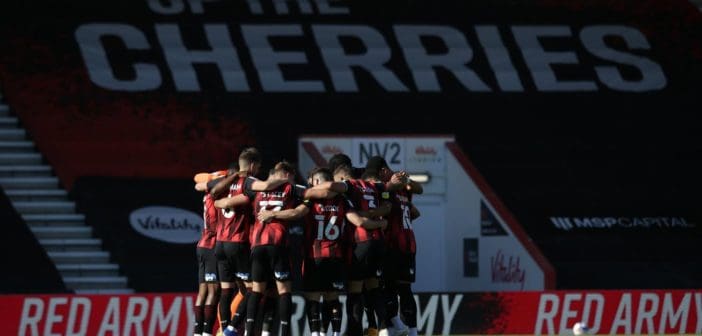Jason Tindall’s stepping-out process is well underway at Bournemouth.
No one is trying to hide it, Eddie Howe still cuts a palpable shadow at the club. But 58 days on from his departure, his best-laid plans and blueprints are beginning to be rewritten. The club’s greatest figure is gone and like any form of grief, people mourn in different ways and at different times.
While some supporters may be in the ‘working through it’ phase, Howe’s closest coaching aide is at the ‘moving on’ point. Sunday’s victory against Norwich may have been unconvincing, but offered the greatest clue yet into Jason Tindall’s plans to revitalise the side.
Everything seemed the same, but different – if you can even fathom that oxymoronic line. It was to be expected that Howe’s fingerprints would remain all over the team, all over the stadium. The same songs Howe used to personally demand before and after the game were still being played and so were all 11 players on the pitch, all bought by Howe.
But in Jason Tindall, they have a manager beginning the passage out of the immeasurable silhouette.
Tindall’s 22-year affiliation with Bournemouth is flush with unforgettable highlights. No one knows better how fortunes in football can fluctuate so erratically and ruthlessly, having endured the extensive emotions the sport has to offer. They say sharing an affinity with a football club is like marriage, and Tindall may just well testify to that.
He’s seen the club at its worst and certainly at its best. The 42-year-old’s relationship with Bournemouth has spanned over half his life. He was there when they were on the brink of collapse, living hand-to-mouth and scrabbling around just to keep on breathing. He was there for the match against Grimsby Town, when their football league status was hanging by a single thread.
He was there when Howe came back after leaving for Burnley. He was there for three promotions. He was there for five seasons in the Premier League. He was there for one relegation. He was there for all the agony and all the ecstasy.
You would think he’s seen it all. Not quite.
This season, Jason Tindall finally had the chance to move front of house. Throughout his playing and coaching days, he’s always been in the shadows, the reliable yet unremarkable figure to Eddie Howe. Despite 173 appearances as a player and over a decade as an assistant, he’s always been in the background, perceived as just the sounding board to all Howe’s pre-eminent achievements.
But he’s no longer the understudy, in fact he’s now centre stage. Of course he will never be Howe, nor will he leave the legacy his great friend did.
Some could argue he’s on a hiding to nothing. If Bournemouth get promoted this season, well that was the target. If they don’t, he’s just another assistant who proved the jump to the top job was too cavernous a step. It’s a rarity where successes as an assistant align to being a success as a manager.
But three games in, Tindall is already showing signs that he’s prepared to step out into the spotlight. Here is what’s changed at Bournemouth.
A change of system
Tindall surprised some when he began trialling a new 5-3-2 formation in pre-season. His predecessor flirted with the system intermittently during Bournemouth’s Premier League stay but always reverted back to his tried and trusted system of 4-4-2.
When they were last in the Championship, the 4-4-2 would place great emphasis on expansive, attacking wing-play, with turbo-charged combinations between the full-backs and wingers a hallmark of their ascension through the leagues. They would overload wide areas and prove adept at providing a variation of crosses for the two strikers to finish. Whipped, curled, drilled, front or back post – you name it, they would do it. And with alarming regularity, too.
With Tindall adopting a structure with wing-backs exclusively providing the width, they evidently don’t quite have the same offensive patterns of wide-play. This means they now attack from more central, narrower angles on the pitch.
The two up top are now more of a one-one, with Arnaut Dajnuma dropping in as a number 10. This means Bournemouth’s highest forward – in this case Dominic Solanke – is far more isolated than Howe’s commonly-used pairing of Callum Wilson and Josh King. The close proximity of the pair in relation to where they were on the pitch proved conducive during their top-flight stay, due to their ability to link well in tight areas.
While Howe’s 4-4-2 system lent itself to producing a high turnover of chances at either end, Tindall’s extra body in defence means they are far more preserved in transitions, since they are committing forward less players. It gives an extra layer of protection defensively, but lacks the attacking ingenuity of yester-year in the final third.
Bournemouth now play an industrious midfield three, albeit without the technical incision of Howe’s central midfield pairing. Their remit has become more defensive, tasked with ensuring the space between the lines are tighter and closely-packed than previous years. When Norwich matched the 5-3-2 system in the second-half and pinned the Bournemouth full-backs, the midfield trio were made to incessantly shuttle across the width of the pitch, upon switches of play.
Tindall’s side were happy to sit and protect what they had, something a little more archaic than Howe’s original “you score, we score” brand of football. They were shrewder in managing game situations and keener to close ranks. Although they did do so comfortably, it’s worth bearing in mind the caveat that Norwich were without Todd Cantwell and Emi Buendia, their two most proficient attacking players.
A change of look in the dugout
Photo: Getty Images
Stay with me here. Admittedly it’s worth hardly any significance, but Tindall’s choice of clothing provided an insight into a man wanting to establish his own identity. He has traded in the tracksuit attire he’d been donning for well over a decade for a more suave approach to fashion. Skinny tracksuit bottoms were replaced with skinny (yet smart) trousers, with black shoes marked with a white outline preferred to Nike trainers.
Tindall espoused one of Howe’s former practices though, having Simon Weatherstone – first team coach – stationed in the East Stand. Weatherstone would bark out instructions from the side opposite to Tindall’s dugout.
A change of attacking construction
As touched on, Bournemouth’s shortage of bodies in the final third naturally means they have fewer offensive avenues to explore. It can result in build-up play being one dimensional, particularly if the wing-backs do not offer much going forward. As underlined in the manner of Danjuma’s solo winner, it is likely they will rely on individual quality, rather than collective drive, to create openings.
But the side are still insistent on playing out from the back and through the thirds with deep-lying midfielder Lewis Cook passing through the lines, akin to Harry Arter in the Championship. The outside centre-backs split either side of the goalkeeper as two passing lanes. Steve Cook, at the heart of Bournemouth’s back five, positions himself on the edge of the semi-circle, providing an extra option when playing out.
However, Steve’s Cook’s positioning does block a direct passing option into his namesake. This caused Bournemouth more difficulty in playing sequentially through the thirds, stringing multiple passes together to work their way up the pitch. With Lewis Cook unable to get on the ball, it meant the outside centre backs had to execute accurate, incisive passes through the central thirds, usually the most congested area of the pitch.
When it proves too troublesome and the potential risk doesn’t warrant the reward, the Cherries instead opt to bypass the opposition press and play directly into the channels.
A change in personnel
At the time of writing, Bournemouth are one of two teams in the league yet to make a signing this summer. 10 of the players that started the match against Norwich were in the squad that went down last season, with just Asmir Begovic returning from a loan spell at AC Milan.
Aaron Ramsdale, Nathan Ake and Callum Wilson have departed, giving ample opportunity to players that were formerly on the periphery for regular game time. Chris Mepham, Solanke and Danjuma Solanke are set to be the chief beneficiaries from the summer sales.
A change in mentality
Photo: AFC Bournemouth
The Norwich game was a struggle. It wasn’t the free-flowing, easy-on-the-eye football supporters were accustomed to seeing under Howe, particularly in this league. But given the arduous slog of a Championship season, accentuated further by the Covid-condensed schedule, installing an ostensible dose of practicality may just be the way to go.
Aesthetically, Tindall’s side seem savvier and far more street-wise; while they won’t transport you to other-worldly places with their style, the evidence so far suggests it could work.
Of course, producing football of mere fantasy is always a utopia supporters crave. And under Howe, Bournemouth somehow achieved that dream.
But times have changed. We live within a strange, unparalleled period where uncertainty casts a long shadow. And just like many things in the world, a sense of pragmatism may just be required – Jason Tindall is giving Bournemouth just that.
![Prost International [PINT]](https://prostinternational.com/wp-content/uploads/2021/08/PINTtFontLogoRoboto1536x78.jpg)



